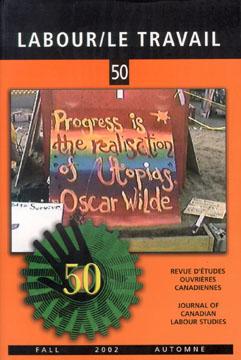Abstract
Tribute to, and assessment of, the first 49 issues of Labour/Le Travail concentrates on both the tone and the substance of the journal. The seven sections of the article discuss matters ranging from art and design, to the rich poetry long included in its pages, to the ability to publish articles that are at once politically informed and academically rigorous. The evolution of the wide-ranging and exemplary book review section and the long standing attention of L/LT to racial and gender divisions among working people receive attention, as does a brief comparison of the trajectory of L/LT with that of Labor History in the United States. A final section considers the necessity for free wheeling debate among labour historians, particularly over the question of class and the place of Marxism in our work.
Résumé
Le hommage aux 49 premiers numéros de Labour/Le Travail, de même que leur évaluation, se concentre sur le ton et le contenu du journal. Les sept sections de l’article traitent des sujets variés allant de l’art et la conception, à la poésie longue et riche contenue dans ses pages, à la capacité de publier des articles contenant des ideés à la fois éclairées politiquement et rigoureuses intellectuellement. L’évolution de la section de critique des livres, élargie et exemplaire, ainsi que l’attention invétérée portée par Labour/Le Travail aux divisons de races et de genres parmi les travailleurs ont attiré l’attention, de même qu’une brève comparaison du parcours de Labour/Le Travail avec celui de la publication Labor History aux États-Unis. Une dernière section prend en considération la nécessité d’avoir du débat libre parmi les historiens, en particulier sur la question de classe et la place de Marxisme dans notre travail.
